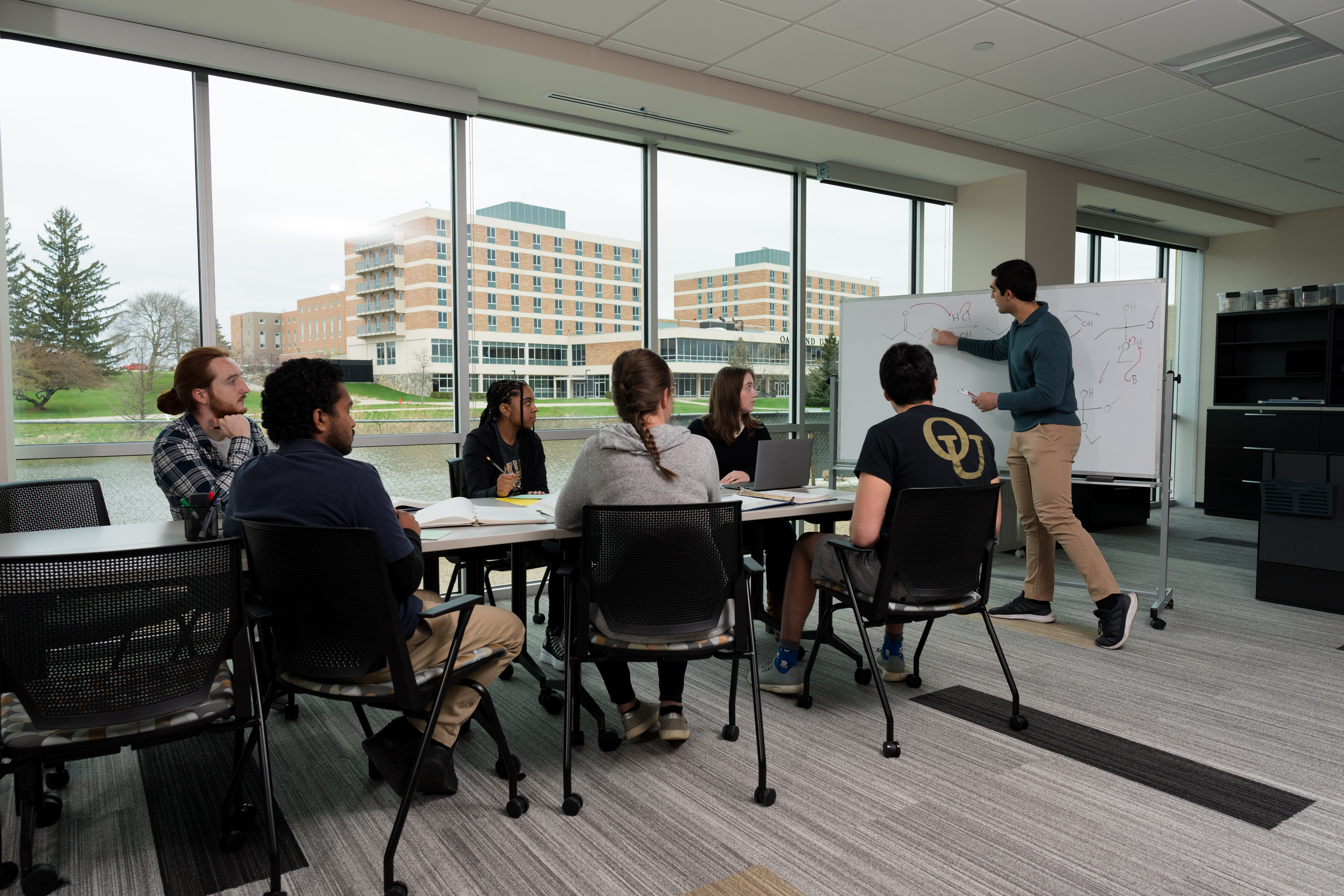Center for Excellence in Teaching and Learning
Kresge Library, Room 430
100 Library Drive
Rochester,
Michigan
48309-4479
(location map)
(248) 370-2751
[email protected]

Normalizing and Promoting Academic Success Support
Support services such as peer tutoring and Supplemental Instruction have been associated with positive outcomes for students such as increased GPA, use of effective learning strategies and retention (Arco-Tirado et al., 2011; Reunheimer & McKenzie, 2011; Dawson et al., 2014). Unfortunately, many students who would greatly benefit from seeking support never do. For instance in one study, students with lower self-esteem regarded seeking help as more threatening (Karabenick & Knapp, 1991). Another study found that students who felt less comfortable in the university environment associated help-seeking behaviors with feelings of inadequacy and inferiority (Winograd & Rust, 2014). Because of this, the Academic Success Center (formerly The Tutoring Center) welcomes support from faculty in helping students understand the benefits of utilizing our various services.
For students who need assistance with course content, the center offers drop-in tutoring, Supplemental Instruction and study groups, with a focus on 1000 and 2000-level courses. In addition, students can receive one-on-one assistance with test preparation, organization, time management, study strategies, and other success-related topics through academic support appointments.
Ways to Partner with the Academic Success Center
Use destigmatizing language when introducing support services.
Students often associate seeking help as an admission that they are struggling. Proactively counter this association by sharing that asking for help is precisely what successful students (and people) do (Moore, 2019). While we certainly want to reach students who are underperforming in their courses, it is helpful when students see our services as a normal part of the learning process, and understand that tutoring and SI allow them the opportunity to actively discuss what they are learning with others. As opposed to stating, “If you have trouble, tutoring is available,” you might say, “Students who are successful in this course actively engage with the material and address questions that come up right away. Regular tutoring/SI attendance is highly recommended for your success.” If you would like to add a statement about the Academic Success Center to your syllabus or Moodle page, we have Sample Faculty Moodle Statements. CETL’s Syllabus Template also offers language on academic success support.
Invite staff to speak with your class, with strategic timing.
Our staff is available to visit your class and speak briefly about our services. We find that students are a more captive audience when they hear this information after receiving grades for an exam, as opposed to at the very beginning of the semester. If you are interested, you can request a presentation.
Refer students who need assistance with learning strategies.
Students’ difficulties often go beyond understanding course content, especially as they transition from high school to college. Many students do not yet understand how to be independent learners, how to think critically about information presented, and how to implement study strategies that lead to comprehension and retention. In addition, learning to manage multiple assignments, technologies and deadlines without the constant check-ins the high school environment provides is a large adjustment for many students. Students who are repeating a course are also in need of support, so they can reflect on their challenges and brainstorm new strategies. Because of this need, our professional staff is prepared to help students with study and time management skills through our academic support meetings. Students can be referred directly to our website to make an appointment or you may email us at [email protected] if you would like us to reach out to a student on your behalf.
Help us grow our team by identifying high-achieving students.
While we actively post our positions on Handshake, faculty are instrumental in helping recruit potential tutors and SI Leaders. Even students who perform very well may not see themselves as someone who could help others succeed. Your encouragement and support gives students a boost of confidence to apply. You can recommend students directly to us.
Quick Resources
We warmly welcome your feedback and suggestions as we all work together to support our students. You can find us at our new location in 1100 East Wilson Hall.
- ASC Website
- Tutoring schedule
- Supplemental Instruction schedule
- Academic Support Appointments
- Residential Support
- Study Resources for Students
- Request a visit to your classroom
- Recommend a future tutor/SI Leader
References
Arco-Tirado, J, Fernandez-Martin, F, & Fernandez-Balboa, J. The impact of a peer-tutoring program on quality standards in higher education. Higher Education, 62(6), 773–788. https://doi.org/10.1007/s10734-011-9419-x
Dawson, P., van der Meer, J., Skalicky, J., & Cowley, K. (2014). On the effectiveness of Supplemental Instruction: A systematic review of Supplemental Instruction and peer-assisted study sessions literature between 2001 and 2010. Review of Educational Research, 84(4), 609–639. https://doi.org/10.3102/0034654314540007
Karabenick, S. A., & Knapp, J. R. (1991). Relationship of academic help seeking to the use of learning strategies and other instrumental achievement behavior in college students. Journal of Educational Psychology, 83(2), 221–230. https://doi.org/10.1037/0022-0663.83.2.221
Moore, C. (2021, September 16). Asking for help shows strength, not weakness. CETL Teaching Tips blog. Center for Excellence in Teaching and Learning at Oakland University.
Reinheimer, D, & McKenzie, K. (2011). The impact of tutoring on the academic success of undeclared students. Journal of College Reading and Learning, 41(2), 22–36. https://doi.org/10.1080/10790195.2011.10850340
Winograd, & Rust, J. P. (2014). Stigma, awareness of support services, and academic help-seeking among historically underrepresented first-year college students. The Learning Assistance Review, 19(2), 17.
Save and adapt a Google Doc version of this teaching tip.
About the Author
Mariana Allushuski is an assistant director at the Academic Success Center. She helps students reflect on their academic habits and develop more effective learning and time management strategies. At the end of October, Mariana will be moving to a new role as Director of Academic Success at OUWB.
Others may share and adapt under Creative Commons License CC BY-NC.



